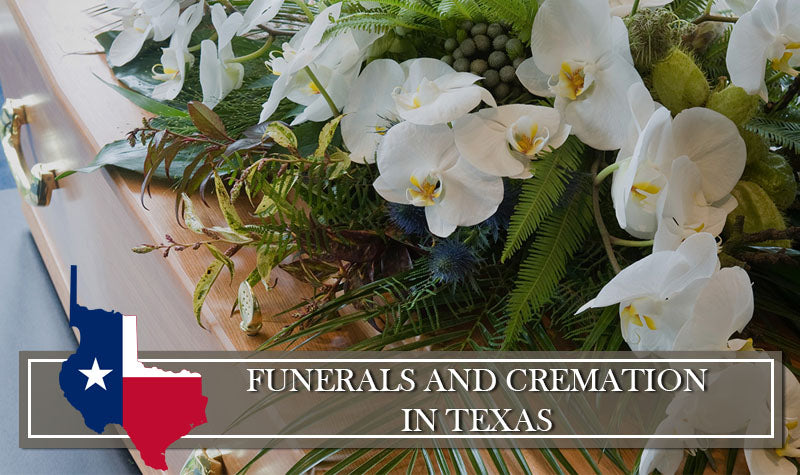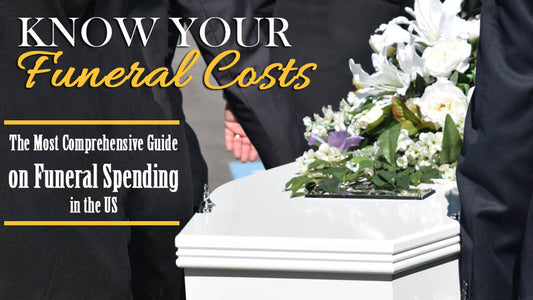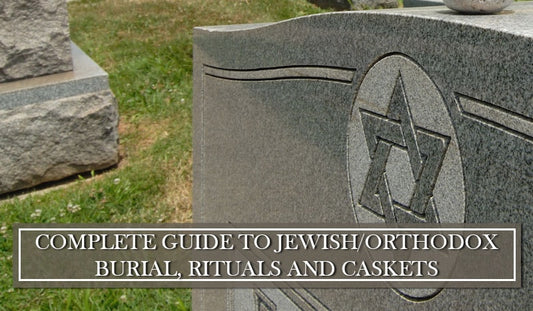
Rules and Regulations on Funerals, Burials and Cremation in Texas
There are many things in life that we cannot run from, and death is one of them. Sooner or later, we all have to deal with it, whether it's the death of someone we love our own.
Laws and regulations on funerals are available and standard among states, but some rules are specific. The following guide will help you make the right choices in Texas, as there are going to be so many things to decide.
What’s the first thing to do when someone dies in Texas?
Knowing what to do first when death occurs is challenging. When death happens in Texas, the coroner, Justice of the Peace, or an attending physician has to establish the death.
If the deceased has a prepaid funeral plan or expressed their wishes, the funeral arrangements should go fine. Contacting the funeral home or cremation provider comes next, so keep reading for the details.
If the death is sudden and the deceased didn’t make any arrangements, the whole process will be difficult. That's why getting informed in advance becomes essential.
Are there specific steps to take for obtaining the death certificate?

Texas law gives you ten days after the death and before the final disposition to file for the death certificate with the local registrar.
At the moment, electronic death registration is functioning in Texas, but some doctors and funeral directors don't use it just yet. When a funeral director isn’t helping you, it’s your legal obligation to file in the Report of Death form with the local registrar.
The latter transmits an electronic record to the medical certifier for completing the medical section. Not all the medical certifiers are in the system, in which case the registrar has to transmit the paper death certificate for signing.
Afterward, you will need to give the death certificate back to the registrar's office for completion.
If a funeral director is hired, he/she will file the death report, get the medical certification, and also file for the death certificate.
Why do people need copies of the death certificate?
The copies of the death certificate will be required in many situations. Copy of the death certificate is also needed when transferring the properties of the deceased to the inheritors.
It’s possible to file the death certificate and ask for copies the same day. You will pay a small fee for every copy that you request. You will need more than ten copies if you’re the executor of the estate.
You can also keep copies for your records, or for completing your tasks if you're responsible for the deceased's affairs. Life insurance processes, payable-on-death accounts, Social Security benefits, veteran benefits are only some of the situations when a copy of the death certificate is required.
What is the price of a copy of the death certificate in Texas?
Expect to pay $20 for the first certified copy of the death certificate in Texas and $3 for all the additional copies.
How can you obtain copies after the time of death?
If you need to get more copies after death has occurred, you can go to the Texas Department of State Health Services. There, download a mail-in order form or see the documents requested for ordering the death certificate online or in person.
Make sure you have an ID photo released by the government when asking for a copy of the death certificate. Any other acceptable identification will be helpful.
Who’s lawfully entitled to ask for a death certificate in Texas?
The Texas law states that for deaths occurred in the last 25 years, the persons legally allowed to ask for a certified copy of death certificate are:
- An immediate family member of the person whose name appears on the certificate
- A person capable of providing legal documentation that proves the direct and tangible interest in the death certificate. An insurance policy naming you as a beneficiary is an example.
Who’s lawfully responsible for finishing the death certificate?
The funeral director can finish the death certificate once he gets the information from the family and the medical professionals.
The physician caring for the deceased for the health condition will complete the medical certification. This step is possible only when the cause of death was natural.
If not, the death has to be reported to the authorities for investigation and filing of the medical certification. The funeral director must receive the medical certification in five days at most.
Sometimes, the cause of death cannot be established inside of five days, and the medical examiner/physician has to report the reason for the delay. Until he/she approves, the body cannot be disposed of.
Who has the lawful obligation for the body disposition and funeral in Texas?
Texas law establishes who has the legal obligation for making the funeral preparations in Texas. The right and responsibility go to the following people, in this order:
- An agent named by the deceased in the written document before the death
- The surviving spouse
- An adult child
- One of the parents
- An adult sibling
- One or more of the executors/administrator of the estate
- Next of kin according to the law
Is it difficult to name an agent?
You must utilize a form according to law in Texas when naming someone to take care of your final arrangements. Signing and dating the form in front of a notary public is also mandatory.
The representative you named also has to sign the document. A copy of the form in the Texas statutes or a form free to download from the Funeral Consumers Alliance of North Texas is available.
People in the military
Professionals in the military may note their final wishes in the Record of Emergency Data that the Department of Defense provides.
Who is legally obliged to cover the funeral spending in Texas?
Funerals are expensive, and we can understand why so many people think ahead and have financial plans for the funeral.
People can pay in advance for the funeral or leave the right amount of money for the surviving family members.
What are the benefits of paying in advance for the funeral?
Persons interested in paying for the funeral before the death should look for a reliable funeral home. They need to make a document with precise information on the plans so that it's easy for the family members to follow it.
The law asks the providers of funeral services and merchandise to take care of your funds, but the risk of accidents is never null. Additionally, a funeral home may go out of business, so wisely choosing is essential.
Why saving money is a wise plan for covering funeral spending?
Having an estimate of your funeral spending and putting money aside is one of the safest and more reliable ways to be prepared. You should put the money in an interest-earning bank account and name the beneficiary. He/she will ask for the funds at the time of death. The beneficiary should be reliable and to make sure that he/she will only use it for the funeral spending.
How much money will you pay for a funeral in Texas?
The National Funeral Directors Association states that a traditional funeral is around $7,000. The sum doesn’t include the cemetery expenses, markers, flowers, or obituaries. After adding these expenses, you may end up spending $10,000 for the funeral.
In Texas, funeral homes have to offer retail price information by phone. Moreover, the law obliges the funeral home to present a general price list (GPL) to anyone entering a funeral home. The list has to show the prices for funeral merchandise and services too.
People have been looking into more affordable options for years now. Therefore, interest in cremation services has increased a lot. You may pay even less than $1,000 for cremation in Texas, without sacrificing too much on the ceremony.
Is the Texas law forcing one to buy a casket?
Caskets are probably the most significant spending in a funeral and the main reason for caskets online, the funeral homes usually have a high markup on the caskets, so buying the casket online could be a good idea.
See our selection of caskets, shipped fast throughout the entire State of Texas.
Burial in Texas
No Texas law makes the use of casket mandatory for the funeral. Don’t be surprised if the cemetery of your choice has strict regulations, though. Not only that, you need to buy a casket, but you may also have to purchase a particular type too.
Cremation in Texas
In the state of Texas, no laws oblige you to use a casket for cremation, either. By all means, the federal law asks the funeral home or crematory to present your alternative containers. Moreover, you should be able to purchase an alternative container from them too. Typically, these containers are made with cardboard, pressed wood, unfinished wood, or fiberboard.
Green burial in Texas
More and more people think about the environment and decide to go with environmentally-friendly funerals. Everything from the clothing to the casket and tools used for digging the grave has to be environmentally friendly. Typically, green burials are less expensive than traditional burials, especially since the caskets are cheaper.
Is it compulsory by the law to hire a funeral director in Texas?
In every state, it's not forbidden to have the body of the deceased at home after death. No law obliges you in Texas to hire a certified funeral director.
However, Texas regulations ask the person in charge of the body to file the “Report of Death" with the local registrar in the first 24 hours after receiving the body. A new Report of Death can easily be downloaded from the Texas Vital Statistics Unit website.
What’s the best way to decide for a funeral home in Texas?

1951 funeral homes and cemeteries are currently running in Texas. The funeral homes in Texas are organized by zip code and cities. It’s rather straightforward to find a funeral home in the zip code area you need.
The Texas Funeral Service Commission licenses all funeral homes in Texas.
Are you supposed to purchase the casket from the funeral home?
Absolutely not. On the contrary, the federal law obliges the funeral home to allow you buying a casket from a third party. And once you purchase it, you can also have the casket delivered straight to the funeral home. Make sure you shop around and check online retailers too. They offer a great variety of models for prices fitting all budgets.
What’s the Texas legal take on embalming?
Unless the final disposition takes place in 24 hours after the death, embalming, refrigerating the body or storing it in a sealed container become mandatory in Texas. When death takes place, but no authorized person or relative claims the body, embalming is mandatory within 24 hours.
Do you need any legal permits for transporting the body? Is embalming mandatory then?
A copy of the Report of Death also functions as a permit for transporting and bury the body within Texas. If you’re going to send the body outside Texas or shipping it by common carrier, you need a burial-transit permit after filing the death certificate. The local registrar will emit the license.
Additionally, Texas regulations specify that the body has to be embalmed and put in:
- A sound casket inside an airtight metal/metal-lined shipping case
- Airtight metal casket encased in a tough outside shipping case.
Is embalming the only option?
Dry ice and refrigeration may preserve the body, but it's only for a short amount of time. Funeral homes can refrigerate the body for a number of days and ask for a fee if you need to postpone the final disposition of the body.
What are the lawful places for burying bodies in Texas?

Most of people decide to bury their loved ones in established cemeteries. However, the law allows burials on private ground too.
Which regulations apply for the home burial in Texas?
You have to contact the town or county clerk to find out the local regulations on home burial. Should you bury a body on private land, you need to make a map of your land, highlighting the burial ground. Filing the plan with the property deed is also required. The location has to be accurate for other people in the future.
You can also check the Texas Funeral Service Commission for more information.
What do the Texas laws state on cremation?
Expect the crematory to ask you to hire a funeral director for planning the cremation. If hiring a funeral director isn’t something you want, you should at least contact the crematory to see if they take the body straight from the family.
In Texas, you may utilize the burial-transit permit released by the local registered as cremation permit. The license is released after the filing of the death certificate.
Waiting period
Unless a justice of the peace, court order or medical examiner waives in writing otherwise, the 24-hour waiting period is required in Texas.
When the waiting period is over, the cremation can proceed. The cremation authorization must be signed by the next of kin before the cremation form is released.
What are the legal and financial aspects of a direct cremation in Texas?
More and more people choose direct cremation for many reasons. in the case of direct cremation, there’s not service, and there’s minimal action from the funeral home too.
The deceased is collect from the place of death and taken to the funeral home or crematory. Once the 24-hour waiting period is over, the body is cremated in a plain cardboard container. The ashes will be send to the family later on.
As for the costs, you may pay anything from $695 to $1200 for direct cremation. It also depends on where you live in Texas. Expect to pay more in some rural regions; shop around for getting the best offer for direct cremation, nevertheless.
What to expect at a Texas cremation service with a memorial?
A cremation service with the memorial is similar to a traditional burial service, but the body is cremated and not buried. You may choose different ways of conducting a cremation funeral in Texas.
Some choose to have a funeral service with the deceased before the cremation. Others have the cremation first and hold the memorial with the cremated remains or not. It’s all up to the deceased and the family.
What’s the Texas law regarding the storage/scattering the cremated remains?
Once again, you have the liberty of keeping the ashes in a container or home, or in a crypt, niche, or grave. Spreading the ashes on public lands is also lawful, but you should read down below for the details.
Cremation makes the human remains harmless, so they don't pose any risk for public health. Many people rely on common sense when spreading the ashes, making sure that other people don't notice the remains.
Private property
The Texas law allows you to spread the cremated remains on your property. However, you should get permission from the landowner when you want to scatter the ashes on someone else's property.
Settled scattering garden
It’s not unusual for cemeteries to offer gardens for spreading the cremated remains. Talk to a cemetery representative to find out the instructions.
Public property
Even if no Texas law forbids you to scatter ashes on public land, it's wiser that you check county and city regulations first. Use your best judgment when spreading the cremated remains.
Federal property
In theory, you would need permission before spreading the ashes on the federal estate. The chances for not getting authorization are quite low, though. As long as your ceremony is quiet and you keep the ashes away from facilities, roads, trails, and waterways, you should not worry when spreading the ashes.
At sea
The federal Clean Water Act mentions that spreading the cremated remains must be done only when you’re three nautical miles away from the land. Non-bio degradable containers can be used, but they have to be disposed of separately.
The EPA also forbids from spreading the ashes in wading pools by the sea and at beaches. Additionally, you have 30 days to inform the EPA about the ceremony.
Anyone planning to have an inland water burial should check the regulations. A permit is required from the state agency managing the waterway.
By air
The U.S. government doesn’t consider cremated remains to be harmful in any way, but it’s not the same for the containers. The federal aviation laws forbid dropping objects that may injure people or affect properties. Always keep in mind to take the ashes from the container before spreading.
Frequently Asked Questions about funerals in Texas
Q: Does the Texas law allow body donation?
A: The Texas law allows people to have an anatomical donation to research or medical institution within the state. The majority of medical colleges will accept body donation. Some companies organize the whole body donation programs, ensuring a "no-cost" cremation in Texas.
Q: What’s the legal take of Texas on alkaline hydrolysis?
A: At the moment, Texas doesn’t have any regulations or laws about alkaline hydrolysis. For those of you who don’t know, alkaline hydrolysis turns the body into liquid and bones. It doesn’t require much energy and doesn’t release matter into the atmosphere either. It’s a greener option than cremation.
Q: What laws regulate Hispanic funerals in Texas?
A: One of the highest concentrations of the Hispanic population lives in Texas, and immigrants from Mexico make the majority of them. Even if many Latinos and Hispanics repatriate the remains, many of the Hispanic-American people decide that the final disposition should take place in Texas. Therefore, Texas shelters numerous funeral homes dedicated to the Hispanic population.
Q: Should you check the online reviews on funeral homes from Texas?
A: Online review-based consumer culture is also present within the funeral business, so customers can review and compare funeral across Texas online. It's common for a website also to include local business reviews, which only can help clients when selecting a funeral home. Just like with any other product reviewed online, you should always take it with a grain of salt.
Q: What's the lawful procedure to follow when complaining about a funeral home in Texas?
A: Most of the time, funeral homes don't disappoint their clients and deliver the services and merchandise that clients purchased. However, accidents do happen in this business too. Ideally, you should be able to find a solution together with the funeral director from the funeral home.
If you don’t find an agreement with the funeral director, you can always get in touch with the Texas Funeral Service Commission. You can write a formal complaint against a funeral home or crematory, including copies of all documentation required for sustaining your claim.
Blog Author: Tim





